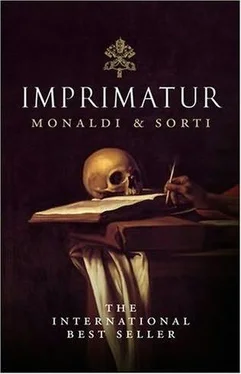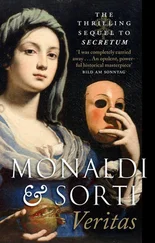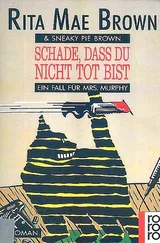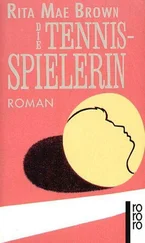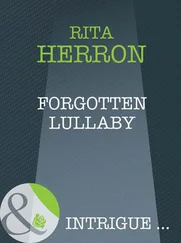Rita Monaldi - Imprimatur
Здесь есть возможность читать онлайн «Rita Monaldi - Imprimatur» весь текст электронной книги совершенно бесплатно (целиком полную версию без сокращений). В некоторых случаях можно слушать аудио, скачать через торрент в формате fb2 и присутствует краткое содержание. Жанр: Исторический детектив, на английском языке. Описание произведения, (предисловие) а так же отзывы посетителей доступны на портале библиотеки ЛибКат.
- Название:Imprimatur
- Автор:
- Жанр:
- Год:неизвестен
- ISBN:нет данных
- Рейтинг книги:5 / 5. Голосов: 1
-
Избранное:Добавить в избранное
- Отзывы:
-
Ваша оценка:
- 100
- 1
- 2
- 3
- 4
- 5
Imprimatur: краткое содержание, описание и аннотация
Предлагаем к чтению аннотацию, описание, краткое содержание или предисловие (зависит от того, что написал сам автор книги «Imprimatur»). Если вы не нашли необходимую информацию о книге — напишите в комментариях, мы постараемся отыскать её.
Imprimatur — читать онлайн бесплатно полную книгу (весь текст) целиком
Ниже представлен текст книги, разбитый по страницам. Система сохранения места последней прочитанной страницы, позволяет с удобством читать онлайн бесплатно книгу «Imprimatur», без необходимости каждый раз заново искать на чём Вы остановились. Поставьте закладку, и сможете в любой момент перейти на страницу, на которой закончили чтение.
Интервал:
Закладка:
Poison. While the physician returned to his chamber, each of us contemplated the corpse in silence. For the first time, the Jesuit made the sign of the cross. Master Pellegrino renewed his imprecations, cursing the misfortune of having a dead man in his hostelry and, what is more, one who had perhaps been poisoned. And who would have the courage to hear what his wife would have to say, on her return?
Talk then spread among the guests about the most notorious cases of poisoning, real or presumed: prominent among these were sovereigns of former times: Charles the Bald, for example, or Lothar, the King of the Franks and his son Louis; or, approaching modern times, th e acqua tofana laced with arsenic, or the Spanish fly, both employed by the Borgias for their abominable crimes, as well as by the Valois and the Guises in their conspiracies. A shameful trembling ran through the group, for poison and fear are born of the same parents. Someone recalled how Henry of Navarre, before he became King Henry IV of France, was wont himself to go down to the banks of the Seine to draw the water which he drank at his meals, fearing that he might fall victim to toxic potions. Did not John of Austria die from wearing poisoned boots? Stilone Priaso recalled how Catherine de' Medici had poisoned Jeanne d Albret, the mother of Henry IV using perfumed gloves and collars, and how she had attempted to repeat the exercise by offering her own son a marvellous book on hunting, the pages of which were a little gummed together, so that he, licking his fingers to turn them, would imbibe the fatal Italian poison with which they were impregnated.
Such murderous preparations had, asserted another guest, been the province of perfumers and astrologers. And someone dusted off the tale of how Saint-Barthelemy, the servant of the ill-famed Prior of Cluny, had killed the Cardinal of Lorraine by paying him in poisoned gold coin. Henry of Luxembourg died-O subtle blasphemy! — of poison concealed in the consecrated host with which he took Communion.
Now, Stilone Priaso began to parley closely with one guest after another, admitting that so many fantastic things had always been said about poets and those who practised the art of fine writing; but he was only a poet, and born for poetry, may God pardon his immodesty!
They then all turned to me and began again to belabour me with questions about the broth which I had served Signor di Mourai that morning. I had to repeat several times that absolutely no one but myself had been near the dish. Only with difficulty were they at last convinced, and they then ceased paying attention to me.
I noticed all of a sudden that the only one to have left the company was Abbot Melani. It was late now, and I resolved to go down to the kitchen in order to wash up.
In the corridor, I almost collided with the young Englishman, Signor di Bedfordi, who struck me as being rather agitated; perhaps because, having transferred his effects to a new chamber, he had not been present for the chirurgeon's diagnosis. This guest was dragging himself along slowly and seemed unusually afflicted. When I stopped in front of him, he gave a start.
"It is I, Signor Bedfordi," I reassured him.
He looked dumbly, lost in his daydreams, at the lamp I bore in my hand. For the first time, he had abandoned his usual phlegmatic pose, which gave away his affected and haughty nature, one that caused him to be repelled (and he often gave me proof thereof) by my servant's simplicity. Born of an Italian mother, Bedfordi had no difficulty expressing himself in our language. On the contrary, his eloquence, in the conversations that accompanied their meals, was much appreciated by the other guests.
His silence that evening therefore struck me all the more. I explained to him that, in the doctor's opinion, there was no cause for anxiety, since this was certainly not a case of plague. It was, however, suspected that Mourai might have ingested a poison.
He stared at me, with his mouth hanging half open, and answered not a word. He retreated several paces, then turned round and returned to his chamber, where I heard him lock himself in.
Night the First
Between the 11th and12th September, 1683
"Forget it, my boy."
This time it was my turn to be startled. I found myself facing Abbot Melani, who had come down from the second floor.
"I am hungry. Kindly accompany me to the kitchen."
"If you please, Sir, first I should tell Master Pellegrino. He has forbidden me to draw on provisions outside regular luncheon and supper hours."
"Never fear, your Master Pellegrino is now hard at it with Madam Bottle."
"And Doctor Cristofano's orders?"
"Those were not orders, but prudent advice; which I regard as superfluous."
He preceded me downstairs, where the dining chamber and the kitchen were situated. In the latter, to satisfy his request, I found a little bread and cheese and a beaker of red wine. We sat down at the work table where I and my master usually ate.
"Tell me, where do you come from?" he asked me, as he began to partake of his refreshment.
Flattered by his curiosity, I recounted briefly the story of my miserable life. At a few months of age, I had been abandoned and left outside a convent near Perugia. The nuns had then entrusted me to a pious woman who lived in the neighbourhood. When I grew up, I was brought to Rome, where I was placed in the service of that woman's brother, the parish priest of Santa Maria in Posterula, the little church not far from the hostelry. After employing me on a number of minor tasks, the priest recommended me to Signor Pellegrino, before he himself was transferred outside Rome.
"So now you are an apprentice," said the abbot.
"Yes, but I hope not forever."
"You would, I imagine, like to have your own inn."
"No, Signor Abbot. I would like to become a gazetteer."
"Now, that is a fine one," said he with a mischievous smile.
I explained to him that the pious and kindly woman to whom I had been entrusted had arranged for me to be instructed by a former serving maid. That old woman, who had previously been in a nunnery, had initiated me into the arts of the Trivium and the Quadrivium, in the sciences de vegetalibus, de animalibus and de mineralibus, in humanae litterae, in Philosophy and in Theology. She had then made me read many historians and grammarians, as well as Italian, Spanish and French poets. Yet, more even than arithmetic, geometry, music, astronomy, grammar, logic and rhetoric, I grew passionately interested in the things of this world, and, most of all, my spirit was inflamed by the telling of the exploits and successes, both near and far, of princes and reigning monarchs and of wars and other admirable things which…
"Good, good," he interrupted me, "so you want to become a gazetteer, or scribe, if you prefer. Men of wit often end up engaged in that trade. How did the idea come to you?"
I was often sent on errands to Perugia, I replied. In town, if I was fortunate enough to be present on the right day, I could listen to the public reading of gazettes, and for two pence one could purchase (but this one could in Rome, too) broadsheets with many notable descriptions of the most recent occurrences in Europe…
"My goodness, young man, I have never come across one like you!"
"Thank you, Sir."
"Are you not rather too learned for a mere scullion? Those of your kind usually do not even know how to hold a pen," said he, grimacing.
That remark upset me.
"You are very intelligent," he added, softening his tone. "And I understand you: at your age, I too was fascinated by the scribbler's trade. But I had so many things to do. To write skilfully for newspapers is indeed a great art, and always better than working. "And then," he added between one mouthful and the next, "to be a gazetteer in Rome is most exalting. You will know all about the question of the franchises, the Gallican controversy, Quietism…"
Читать дальшеИнтервал:
Закладка:
Похожие книги на «Imprimatur»
Представляем Вашему вниманию похожие книги на «Imprimatur» списком для выбора. Мы отобрали схожую по названию и смыслу литературу в надежде предоставить читателям больше вариантов отыскать новые, интересные, ещё непрочитанные произведения.
Обсуждение, отзывы о книге «Imprimatur» и просто собственные мнения читателей. Оставьте ваши комментарии, напишите, что Вы думаете о произведении, его смысле или главных героях. Укажите что конкретно понравилось, а что нет, и почему Вы так считаете.
